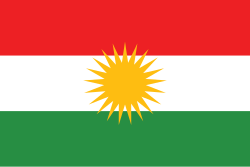Kurdistan
Kurdistan is a nation and proposed sovereign state in northern Iraq and Syria, northwestern Iran, and southeast Turkey in which Kurds are the majority ethnic population. Though an autonomous region exists in the Iraqi portion, an administrative region named Kurdistan exists in Iran and Kurdish fighters control most of the Syrian-Turkish border region in northeast Syria, there is no officially recognized fully independent Kurdish nation-state.
History[edit]
Kurds are themselves an Iranic people, related to the Persian people, with nationalists claiming descent from various groups who had inhabited the area. The term "Kurd" itself only shows up with common usage starting in the Islamic period, with sporadic undefined uses dating to the 300's, and an organized Kurdish nationalist movement begins in the late 1800's in response to Ottoman centralization attempts and gained ground following the empire's collapse following World War I. Unlike the Turks (who speak a Turkic language) and the majority of the Syrian population (who speak Arabic, a Semitic language), the Kurds speak the Kurdish languages, which form an Indo-European dialect continuum; they are part of the Iranian branch of the Indo-Aryan languages and thus related to Persian, somewhat more distantly related to Sanskrit, and loosely related to (among others) English, Russian, and Latin.
Iraqi genocide attempt[edit]
In the late 80's, as his war against Iran stalled, Saddam Hussein conducted a series of actions against Iraq's Kurdish population (amongst other non-Arab people) through the Halabja Chemical Attack and the Al-Anfal Campaign, in which over 100,000 Kurds were put in concentrations camps and killed through mass executions and other methods. Also, 4,000 villages, 1,754 schools, 270 hospitals, 2,450 mosques, and 27 churches were destroyed. If only Saddam's removal didn't go so badly.[citation needed]
Only 4 nations officially recognize this as an attempted genocide - Sweden, South Korea, Norway, and the UK.[1]
Fighting against Turkey[edit]
Due to Turkey's refusal to acknowledge the Kurds as a distinct ethnic group, there are few reliable statistics, but most estimates place Kurds between 25% and 30% of the population of Turkey.[2] Turkey has been in the middle of a slow assimilation of the Kurds for the past century or so. The Kurdish language has been banned in public at times, official records may only refer to the Kurds as "Mountain Turks", and hundreds of thousands of Kurds have been ethnically cleansed relocated.[citation needed] One of the most infamous cases of ethnic cleansing was the Dersim massacre![]() which resulted in the death of 50,000 to 80,000 Kurds[3]; it is considered a genocide by Turkish scholar, İsmail Beşikçi. This has made Turkey somewhat unpopular among Kurds to say the least.
which resulted in the death of 50,000 to 80,000 Kurds[3]; it is considered a genocide by Turkish scholar, İsmail Beşikçi. This has made Turkey somewhat unpopular among Kurds to say the least.
Leyla Zana, the first Kurdish woman elected to Turkey's parliament, spent 10 years in prison for "separatist speech". The speech that landed her in prison? She said, "I shall struggle so that the Kurdish and Turkish peoples may live together in a democratic framework."[4]
Syrian Civil War and ISIS[edit]
In 2013, the Syrian Kurdish Democratic Union Party (PYD) announced the end of Arab Ba'athist governance in northern Syrian Kurdish territories.[5] Over time, Kurds living in this area said they were their own autonomous region called Rojava (meaning 'west'). They formed their own effective military, called the YPG (meaning People's Protection Brigades).[6] As of 2015, it has 65,000 fighters[7], which have fought ISIS extensively for the past few years.
In September 2014, ISIS launched an offensive against the Kurds, attempting to eliminate them through a genocide.[8] ISIS advanced towards the border city of Kobanî and fought a 134-day battle with the YPG there. The Kurds were vastly outnumbered by ISIS by a 1-to-3 ratio. Despite their numerical advantage, ISIS lost more than 2,000 fighters and 18 tanks, while the defending forces lost only about 700 by the highest estimates. The defenders had the luck of being backed by constant close air support from US bombers, which by the end of the battle, totaled over 900 airstrikes, leveling half the city. ISIS has since been pushed out of the city and all of its hundreds of surrounding villages. Several other important towns that ISIS previously held, namely Tell Abyad, Suluk, Ayn Issa, Sarrin, Hishah, and Tishrin were also all liberated in the following year, dealing a strategic blow to ISIS and its ability to bus in fighters from Turkey use the Turkish border as a transit to recruit foreign fighters.[9]
References[edit]
- ↑ https://www.aljazeera.com/features/2014/4/14/iraq-kurds-press-states-to-recognise-genocide
- ↑ https://web.archive.org/web/20120925004520/http://www.ekurd.net/mismas/articles/misc2012/9/turkey4166.htm
- ↑ https://web.archive.org/web/20091229124622/http://www.pen-kurd.org/almani/haydar/Dersim-PresseerklC3A4rungEnglish.pdf
- ↑ Racism and the administration of justice, Amnesty International.
- ↑ http://rudaw.net/english/middleeast/syria/13112013
- ↑ https://en.wikipedia.org/wiki/People%27s_Protection_Units
- ↑ http://www.todayszaman.com/op-ed_will-the-islamic-state-last-through-2015_368806.html
- ↑ https://en.wikipedia.org/wiki/Syrian_Kurdish%E2%80%93Islamist_conflict_(2013%E2%80%93present)
- ↑ https://en.wikipedia.org/wiki/Siege_of_Koban%C3%AE
